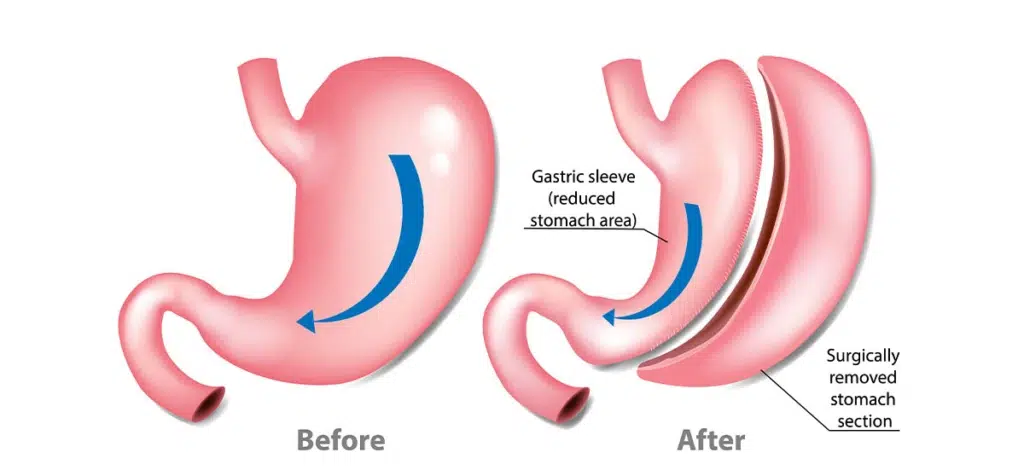Bariatric Surgery Procedure and Recovery Time: What to Expect

Bariatric surgery is an effective and proven procedure for patients experiencing serious obesity and related health issues. When dieting and exercising have not worked, this weight loss surgery can lead to great and long-term success and enhanced quality of health. Regardless, it is important to understand the different procedures of bariatric surgery and the recovery before concluding. In this blog, we discuss the bariatric surgery procedure and recovery time.
What is Bariatric Surgery?
Bariatric surgery is a surgical procedure designed to help patients with serious obesity and related health problems, such as diabetes, hypertension, heart disease, and sleep apnea. These procedures transform the digestive system to restrict food intake or calorie consumption.
There are many types of cutting-edge bariatric procedures, each has its advantages. These procedures are:
Gastric Bypass
Gastric Bypass is one of the most commonly used bariatric procedures and is considered the gold standard for maximum weight loss. In this procedure, a small stomach pouch is created, which restricts food intake. Then, the small intestine is rerouted to link to the new stomach pouch, bypassing a portion of the digestive tract to facilitate nutrient consumption.
Gastric Sleeve
Almost 80% of the stomach is removed in the Gastric Sleeve, leaving a small, sleeve-shaped design. It lowers the stomach’s capacity for food intake and hunger to help control appetite.
Gastric Sleeve to Bypass Conversion Procedure:
Although many patients successfully lose weight after the gastric sleeve procedure, many struggle to maintain it. If patients do not get the desired results, they should consider the conversion procedure of previously failed gastric sleeve to gastric bypass for better and longer-term outcomes.
The Bariatric Surgery Procedure: What Happens During the Surgery?
Bariatric surgery is conducted under general anesthesia, so patients are sleeping during the procedure. Most procedures use minimally invasive methods called laparoscopy, which involves small incisions and generally leads to faster recovery and less pain than normal open surgery.
Procedure Steps:
- Preparation: Before surgery, the doctor evaluates the patient’s different conditions, such as blood tests and imaging, and follows a special diet to prepare for surgery.
- Anesthesia: General anesthesia is used to keep patients asleep and pain-free.
- Incision and Laparoscopy: The surgeon makes small incisions in the abdomen and utilizes a special camera and minimally invasive devices to perform the surgery.
- Procedure Implementation: This part depends on the surgery; the surgeon creates a small stomach pouch, and removes a portion of the stomach. More complicated procedures may involve bypassing sections of the small intestine.
- Recovery in the Operating Room: Patients are observed in a recovery room after surgery as the anesthesia fades.
- Procedure Duration: The Bariatric surgery procedure generally takes only 45 minutes with Dr. Sosa given his incredible experience of over 20,000 Bariatric procedures.
Recovery After Bariatric Surgery
The post-operative recovery depends on different aspects, such as the type of surgery, the patient’s health, and commitment to post-operative guidelines. Although bariatric surgery provides great benefits, understanding the recovery procedure is necessary for successful weight loss without any difficulties.
Immediate Post-Surgery
After bariatric surgery, patients are closely observed in the hospital to ensure no immediate difficulties. The duration of hospital stay generally ranges from 1 to 2 days.
What to Expect:
- Pain and Discomfort: Mild pain and discomfort are expected after bariatric surgery, particularly in the abdominal area. It can usually be treated with prescribed pain medications.
- Nausea and Vomiting: Nausea is a common effect during the first few days after surgery as the body adapts to the new digestive system.
- Dietary Restrictions: Patients will be restricted to a clear liquid diet after the first few days of surgery. Over the period, patients will slowly change to soft foods and then solid foods.
- Mobility: Patients are motivated to do light physical activities after surgery to elevate circulation and control blood clots.
Short-Term Recovery
After almost a week, patients are usually released from the hospital and resume their recovery at home. It is crucial to follow post-operative dietary guidelines and rest as much as possible during this time.
What to Expect:
- Dietary Progression: Patients can generally move from liquids to soft diets such as mashed potatoes and soups after the first or second week.
- Pain and Discomfort: The initial soreness is lessened daily as the incision heals.
- Energy Levels: Most patients feel less exhausted by the second week’s end, but avoiding overexertion is necessary.
Mid-Term Recovery
During this time of recovery, most patients start to feel better, with lessened discomfort and improved energy. The body resumes adapting to the new digestive system, and patients concentrate on more nutritious eating and training.
What to Expect:
- Introduction of Solid Foods: After 3 to 5 weeks, patients can start having more solid diets. Eating small portions and chewing completely is crucial to avoid discomfort.
- Physical Activity: Patients are motivated to add light activities such as walking or stretching.
- Psychological Adjustment: Emotional difficulties may happen as patients adjust to new eating routines and lose weight.
Long-Term Recovery
After only 2-3 months of surgery, patients usually start to see rapid weight loss and redirect their focus to lifestyle changes for longer-term success.
What to Expect:
- Weight Loss: Many patients experience fast weight loss during this period, which will decrease over time.
- Dietary Habits: Patients should embrace a healthy diet and consult with their bariatric surgeon and nutritionist regularly.
- Exercise: More intense exercise, such as weight training and aerobic exercises, should generally be continued to help maintain weight loss.
Possible Complications During Recovery
While bariatric surgery is typically a safe procedure, it is necessary to be aware of possible difficulties, such as:
- Infections at the surgical site
- Vitamin deficiency, particularly in iron, vitamin B12, and calcium
- Gallstones, which can develop because of quick weight loss
- Blood clots or deep vein thrombosis.
Conclusion
In conclusion, bariatric surgery is a proven method for extreme obesity and related health issues. Knowing the procedures, surgery procedures, and recovery is necessary for longer-term success. By following dietary guidelines and adopting healthy lifestyle changes, patients can improve their weight loss journey and the quality of their lives.
FAQS for Bariatric Surgery Procedure and Recovery Time
Question 1. What are the dietary limitations after the bariatric surgery?
Answer: Post-operative dietary restrictions for patients start with a clear liquid diet for the first 3 to 5 days, then change to soft foods, and slowly move to solid foods within a few weeks.
Question 2. What are the common difficulties during recovery after bariatric surgery?
Answer: Patients may undergo pain, nausea, and emotional difficulties as they adjust to their new eating routines and the changes in their bodies. It is crucial to handle these complications, both physically and emotionally.
Question 3. What should we do if we experience difficulties after bariatric surgery?
Answer: If you feel any serious symptoms, serious pain, extra nausea, or any irregular symptoms after the surgery, you must consult your healthcare provider immediately for further guidance.

